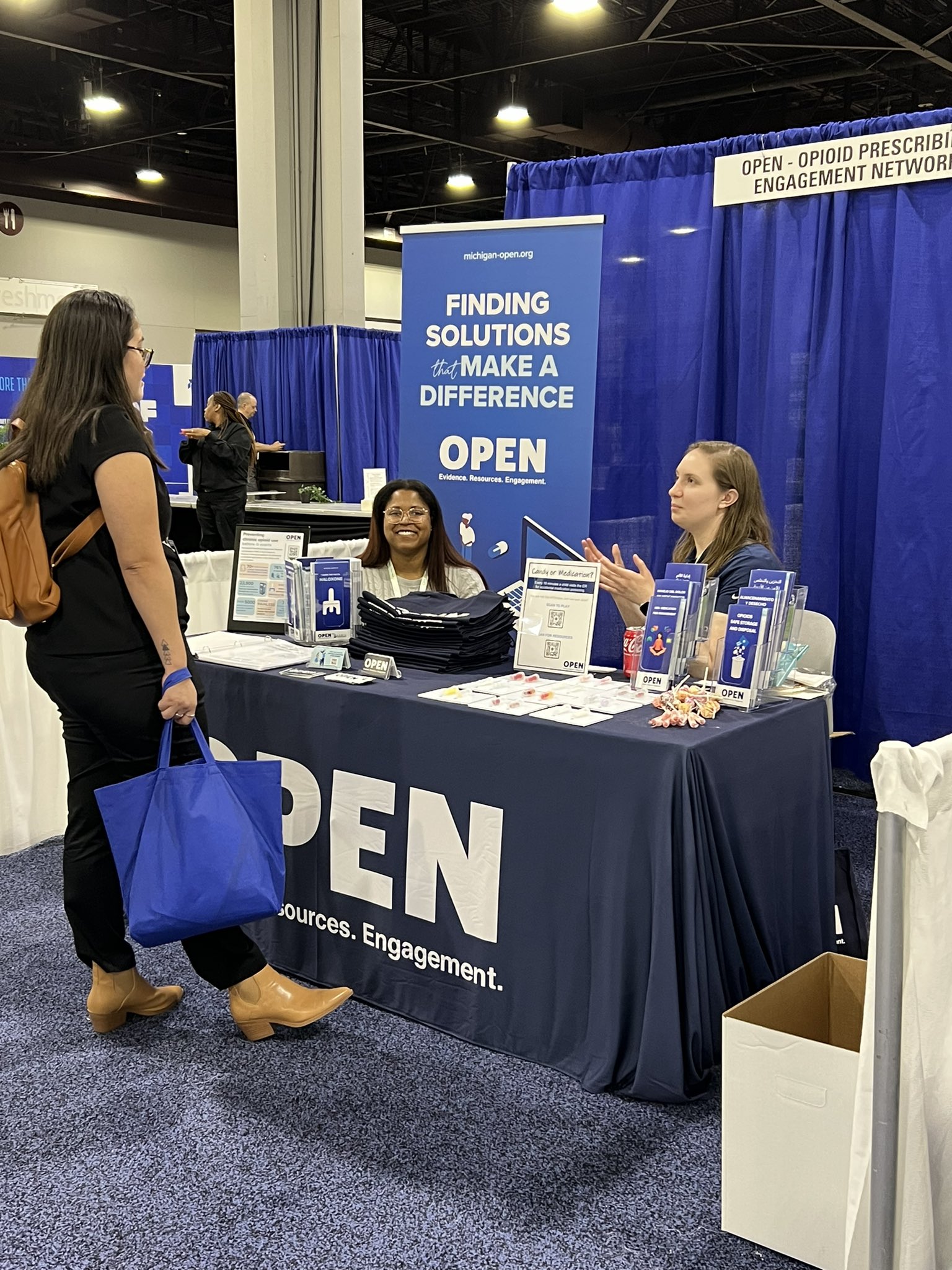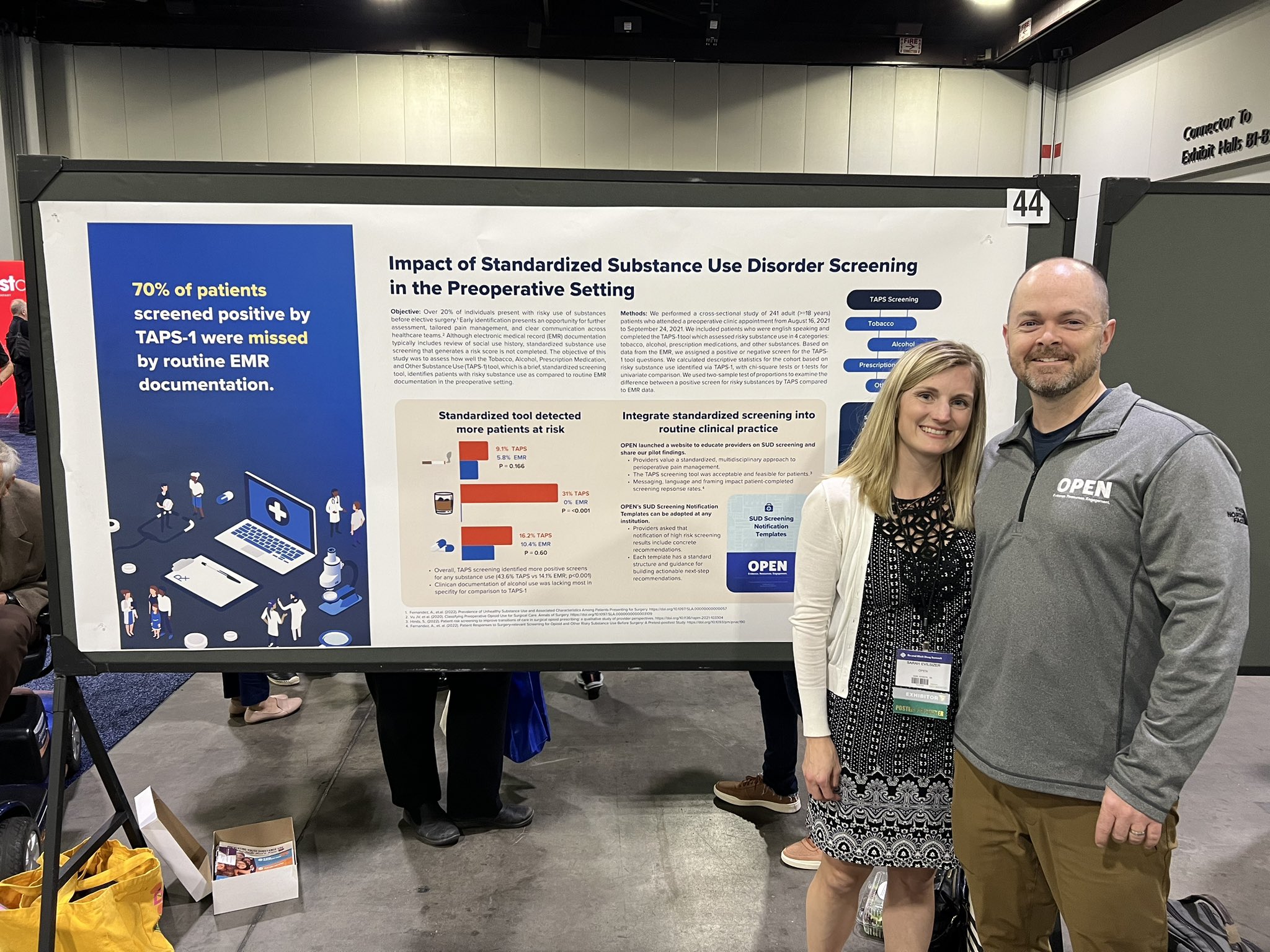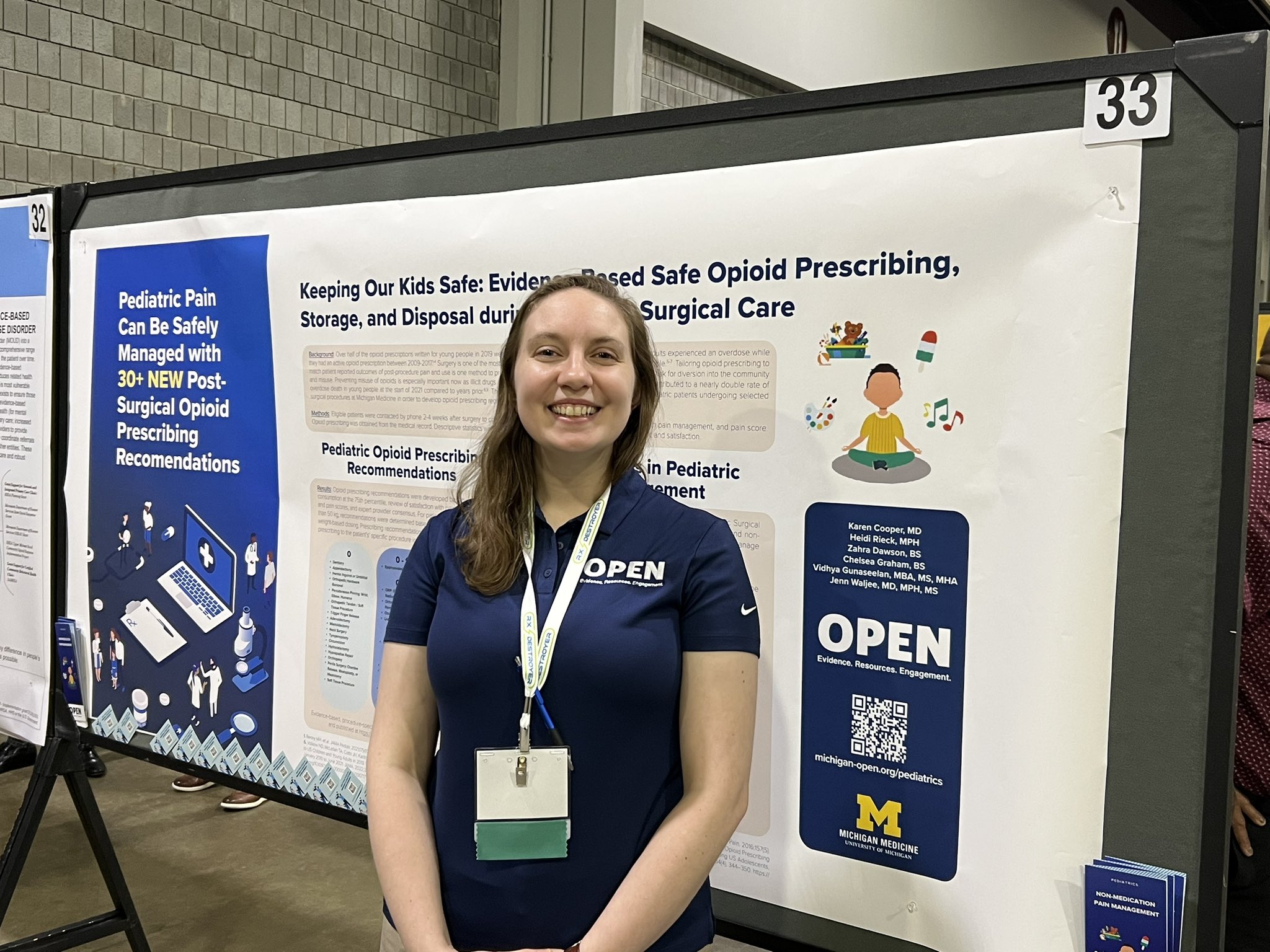The 2023 Rx Summit
In April 2023, the OPEN team attended the 2023 Rx and Illicit Drug Summit in Atlanta, Georgia. The Rx Summit is the largest national collaboration for professionals from local, state, and federal agencies, business, academia, treatment providers, and allied communities impacted by drug misuse. There is much offered at the Rx Summit, including exhibitor booths to learn more about different organizations across the country, poster sessions where organizations can share their research, as well as speaker presentations where featured speakers can share their experiences in the field with attendees.
This year, in addition to having a booth present, OPEN team members presented two posters on substance use disorder screening care and pediatric pain management, as well as a speaker presentation on distributing naloxone to emergency departments across Michigan.
Dr. Chad Brummet, Co-Director of OPEN, talked about the significance of this conference, stating “I’m unaware of another conference that spans a topic so completely and brings all of these people together.” Dr. Brummett went on to say that with the inclusion of research, policy analysis, law enforcement, and community organizations, there is something of interest for everyone to be drawn to.
OPEN’s Rx Summit Exhibit Booth
The OPEN exhibit booth was a highlight at this year’s Rx Summit. “We described what we do at OPEN. We explained the patient and provider focused materials we have to offer and how we utilize these resources in our community,” said Mikyla Buycks, Research Associate at OPEN. Chelsea Graham, a Program Coordinator at OPEN, added “We wanted people to know that we are research and community based. We explained how we utilize research to create educational materials and get that information out into the community.”
Available at the OPEN booth was a variety of educational materials, ranging from our “Managing Pain After Surgery” brochure to our naloxone resources. Another interactive resource at our booth was the Candy vs. Medication Game which demonstrates similarities between candy and medication and highlights the importance of safe storage and disposal of unused medications.

Attendees came to our booth sharing their experiences doing similar work in different states. Many shared challenges they faced trying to implement different programs and asked for feedback and support in how they can better face these roadblocks, while many others shared their own successes and tips for us to utilize. “Everyone wanted to connect, wanted to learn, and wanted to help,” said Graham.
“It was great to see people in other states doing similar things as us. It’s good to know that similar practices are taking place across the country,” shared Sarah Evilsizer, Clinical Implementation Nurse at OPEN. “We are really far ahead in the state of Michigan. We are doing great work and we are successful in what we’re doing.”
OPEN’s Poster Presentations
Sarah Evilsizer presented “The Impact of Standardized Substance Use Disorder Screening in the Perioperative Setting,” which focused on how using a standardized screening tool compares to routine EMR documentation for detecting risky substance use. Evilsizer commented “We shared the work we’ve been doing over the last few years piloting standardized screening and how that compares to the routine care that’s happening now.”

“Conference attendees were surprised at how big of a gap there is in the current substance use screening that takes place. Currently, the EMR documentation focuses on social history, but there’s nothing concrete about it, you aren’t getting any kind of risk score, which can introduce a lot of bias and affect the way we treat patients,” reflected Evilsizer.
OPEN has begun sharing these findings within the community to help local organizations screen for SUD and reduce stigma around it. OPEN has also created a “Substance Use Disorder Screening and Care Coordination Guide” which can be adopted by any institution and helps implement these programs into an organization.
Chelsea Graham presented “Keeping Our Kids Safe: Evidence-Based Safe Opioid Prescribing, Storage, and Disposal during Pediatric Surgical Care,” focused on OPEN’s newly introduced pediatric prescribing recommendations.
When discussing the poster, Graham commented “Our pediatrics poster described data analysis for prescribing recs. We discussed the reduction in the recommended prescribing amounts and how we monitored what patients were prescribed compared to what they consumed.”
When asked about the audience reaction to these findings, Graham reflected on how attendees were open to prescribing recommendations and wanted to learn more. “Many attendees were really surprised to learn about this research. They were engaged in learning more about it and understanding how our research supports these recommendations.”

“Keeping Our Kids Safe: Evidence-Based Safe Opioid Prescribing, Storage, and Disposal during Pediatric Surgical Care,” described the process of how we collected patient reported outcomes (PROs), listed all of our pediatric prescribing recommendations, and included educational resources such as our “Pediatric Pain Management Worksheet” and our “Medication Tracking Log.”
“Implementing a Scalable Statewide Emergency Department Take Home Naloxone Program”
Dr. Chad Brummett, Dr. Gina Dahlem, and Dr. Keith Kocher presented on the OPEN/MEDIC take-home naloxone program implemented in 38 emergency departments across the state of Michigan. “This lecture was about the work OPEN has done with MEDIC, the Michigan Emergency Department Improvement Collaborative that is funded by the Blue Cross Blue Shield of Michigan, as well by the School of Nursing through Gina Dahlem. It’s been a really incredible effort that had, what I thought, ambitious goals at the time, but since the inception it has grown far beyond that” added Dr. Brummett.
Dr. Gina Dahlem, Clinical Associate Professor at University of Michigan School of Nursing, has been educating and training providers and first responders for years on the importance of naloxone access. When discussing the presentation, Dr. Dahlem repeatedly mentioned how important the emergency department workers are for this project to work. “This presentation adds to the testimony of our hardworking frontline providers in the emergency departments to distribute naloxone to people at highest risk of an overdose, we can’t do this without them.” Dr. Brummett expressed a similar admiration for their work, stating “ED physicians across the state have been committed to this process despite being the field of medicine most consistently disrupted by COVID. We asked them to learn something new, do something different during this challenging time. I never heard people complain about not being able to do it because of COVID. I applaud their effort and commitment to this process.”
Dr. Keith Kocher, an emergency physician at University of Michigan and as Director of MEDIC has been engaged in improving care quality in emergency departments across the state of Michigan. “There is an opportunity to improve our approach to harm reduction for patients who come into the emergency department and who are at risk for a potential future overdose from opioids. We believe there is a lot of benefit to directly giving patients naloxone as they are leaving the emergency department.”
During this presentation, our panel described the importance of implementation of this project. “According to data that predates free naloxone distribution, even among those with private health insurance, only 2% of patients admitted to an emergency department for an overdose would go on to fill a prescription for naloxone,” explained Dr. Brummett. “The concerning piece here is that many people admitted for an overdose have another overdose, and some of those people die. Of those who pass, about 25% do so within the first 24 hours.”
Also discussed were some of the challenges involved in building a program like this. One roadblock described was how different emergency departments have different capabilities in terms of implementing this program. Dr. Kocher expressed “There can be very different approaches to building programs. We wanted to explain several options to the audience.” Utilizing a variety of methods, our take-home Naloxone program project has now been implemented in 38 emergency departments across 22 Michigan counties.
“We’re excited to have surpassed 5,000 naloxone kits distributed. It’s important to note that some may think that’s a small number compared to the large volumes of naloxone being distributed nationally. However, when you consider that these were all patients that had been admitted for overdose or at high risk for overdose, we are really targeting this towards the people and families who need it most,” Dr. Brummet shared.

Our panel received a wonderful reaction from the audience, many who went on to ask questions and share their thoughts after the presentation was finished. “It’s important to be able to disseminate your experience and lessons learned along with potential useful tips and tricks. We want to shorten the timeline for others working on similar naloxone harm reduction programs,” Dr. Kocher recalled about the experience.
Our panel also expressed the joy of being able to work with each other on this presentation and on this project as a whole. “This experience highlights our collaboration efforts and expertise in our respective fields. It was a lot of fun to present this information with Dr. Brummett and Dr. Kocher. When it comes to implementing a take home naloxone distribution program in the EDs, no one entity can do this alone. It truly takes a village,” Dr. Dahlem shared. Dr. Kocher shared similar thoughts, adding “It’s been a really wonderful experience. We have different perspectives and strengths, but we share a common goal and vision. To meld these together with a successful program is incredibly rewarding.”
Going forward, our panel expressed wanting to continue the growth of this program and reach even more communities in Michigan. “We want to expand to even more emergency departments across Michigan. We believe that take home naloxone kits after an overdose should be standard of care in all emergency departments. We aim to expand distribution and education to families and friends of patients and make the overall process of receiving naloxone much more accessible,” ended Dr. Brummett.
In Conclusion
The OPEN team was thrilled to attend the Rx Summit this year. Not only for the chance to present on our important work, but for the chance to be around like-minded organizations and learn from each other. “It was amazing to see people with the same passion about substance use prevention and treatment. It was great to see the different and interesting ways people are approaching this problem,” said Ellie English, a Clinical Implementation Specialist at OPEN. Graham added “The vibe was very collaborative. People were incredibly engaged in learning more from each other and finding ways we can work together to make a difference.”
Attending this conference also allowed for team members to further engage and bond with each other. “It was nice getting to go out with the OPEN team and get to know each other a lot better. We had a lot of time to bond during and after the conference, that was really a special highlight for me,” said Buycks.
Conferences like the Rx Summit are important because it brings people together who want to learn about difficult topics and find ways to effectively improve them. “It was very upbeat. It’s challenging territory that we are working in, but everybody there wants to know how we can do better, what else there is to learn, and how we can collaborate on this problem,” said Dr. Kocher. “These conferences are needed to share, collaborate, and learn more about how we can collectively approach this epidemic,” added Dr. Dahlem.
A common takeaway for conference attendees was the importance of continuing this work and finding more ways to share information. “We need to keep getting our materials and educational resources out there to the public. This information is important to share not only in Michigan, but across the country” said Evilsizer.
OPEN looks forward to next year’s conference and continuing to develop our resources and programs to better support our community. When talking about the importance of sharing this work at conferences like the Rx Summit, Dr. Brummett concluded “It’s great to share our successes and hear about the successes of others. This is not a competitive situation.”